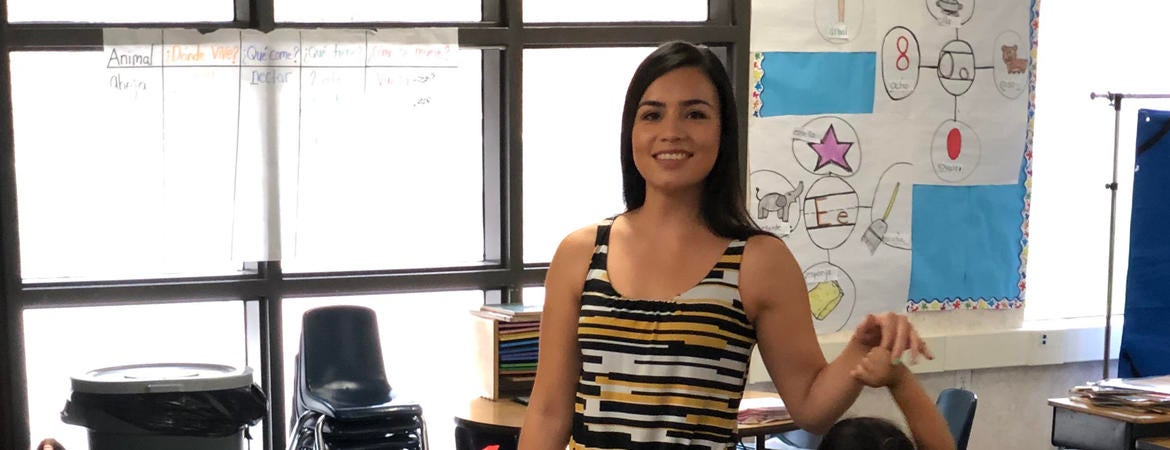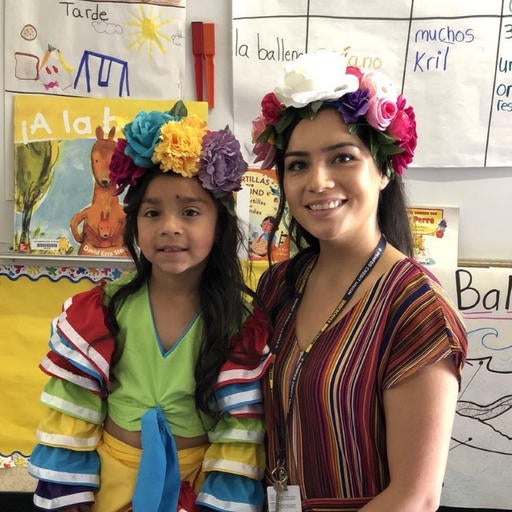
As a first-generation student from the Inland Empire, alumna Brenda Angulo earned her master’s degree in education, teaching credential, and bilingual authorization in 2014 so she could become an educator and advocate in her community. She is currently a kindergarten teacher in the Jurupa Unified School District where she is committed to promoting educational equity and providing quality educational experiences for English learners and their families.
Tell us about your current teaching position. This year I am working with kindergarten students in a dual-language program. My passion for education lies within early childhood literacy, so I can say that I truly love my job. It also helps to be working in a supportive school district. Jurupa Unified School District has presented me with quality professional development opportunities from the very beginning of my teaching career. I invested in these opportunities by submitting my own presentation proposals for local and national conferences. I enjoy sharing the amalgam of best teaching practices that I have accumulated over the years with new teachers from different districts.
I have also joined influential organizations for bilingual education, such as the California Association for Bilingual Education, and organizations for environmental justice, such as the Center for Community Action and Environmental Justice, to learn how to effectively advocate for the success of students and parents in my district.
What is your favorite thing about teaching? One thing that I truly enjoy about teaching is that I get to share my love of learning with others. I love getting to know my students and creating lessons tailored to their needs and interests. It’s also truly rewarding to have the opportunity to work with kindergarten students. They are eager to learn in the most organic fashion, and seeing the amazing growth they make in one academic year is always impressive.
What were some key experiences that inspired you to become a teacher? I was fortunate to grow up with wonderful teachers from K-12, but they did not reflect my culture or community. Nevertheless, my teachers demonstrated unwavering compassion and helped me overcome academic obstacles that I faced as a first-generation student with a low socio-economic background. My teachers served as my mentors and I began to appreciate the humanity of teaching through their efforts. I wanted to work in a field that helped mold me into the academic that I am today and use my cultural identity as an asset to meet the needs of students with diverse backgrounds, strengths, needs, and challenges.
Did you have any mentors who shaped the educator you are today? I am amongst the fortunate few to have been mentored by Ms. Lilian Jezik. She was the bilingual cohort graduate school supervisor at UCR while I attended. She responded to her emails at 4:30 a.m. and helped out with large study sessions after our scheduled seminars. The high level of respect she had for education was evident in every aspect of her life. The best example of her caring mentorship is that every year Ms. Jezik’s previous cohorts organize an informal luncheon and gather to honor her legacy, even after her retirement in 2017.
Can you talk about how the current situation with COVID-19 has impacted your classroom and role as an educator? The current situation has forced my classroom to go virtual. As an educator, I must remember that this is not distance learning, but we are teaching in a crisis. This is becoming an axiom in the field of education during such an indefinable time. Teaching kindergarten in the era of hypermodernity means that I should feel a sense of urgency to provide students with the essential skills needed to feel successful. However, the current struggle is not about meeting today's standards and expectations, but the struggle lies in the importance of mental health and relationship building, which were not previously prioritized by most districts. As a professional, I have leaned on other educators to help me make sense of this.
How did the UCR teacher education program prepare you for the classroom? After earning my bachelor’s in liberal arts in 2013 with cum laude honors from UCR’s College of Humanities Arts, and Social Sciences, I immediately entered GSOE’s master's and teaching credential program, which started a week after graduation. The program was a perfect balance of rigor and support. While we had to take program tests, credential tests, attend seminars, attend network opportunities, and student teach within a compressed academic year, we were always presented with support from faculty who would create pathways to ensure our individual success.
What advice do you have for aspiring teachers? Do not be afraid to reach out for help. If one door closes, that means there is another door waiting for you to knock on it. Teaching can seem like an isolated job since it is one teacher per classroom, but there is a team of educators that are willing to help. Reach out to others through books, social media, within your district, or at conferences.
Do you have anything else you’d like to share? I want to congratulate all of the students who have demonstrated success in this sudden transition to learning from home. Above all, I would like to congratulate the graduating classes of 2020, which includes my own graduating kinder class of 2032! Congratulations to UCR’s graduating classes!
